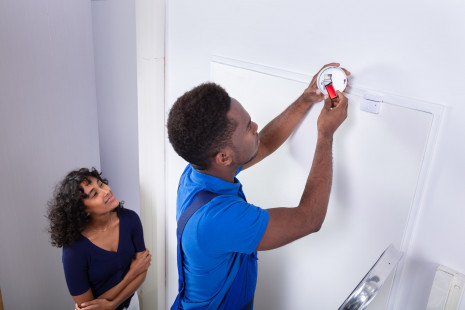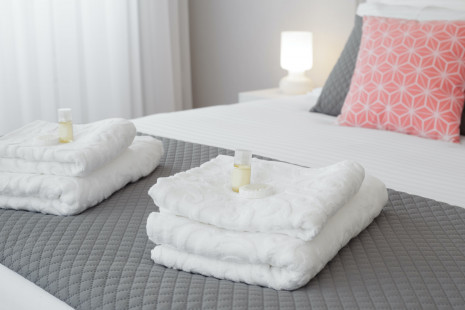How to protect your rental property from fire
If you rent out property, there are things you are required to do by law to keep your tenants safe from fire. There is also information you can give your tenants to help them live safely in your property.
Flats, houses and other properties
Every privately rented property must have at least one smoke alarm installed on every level of the property (mezzanines do not count) and a carbon monoxide alarm in any room containing a working fireplace that uses coal, wood or another type of solid fuel.
As well as flat and houses, other properties include:
- boats
- mobile homes
- caravans
You must make sure the alarms are working at the start of each new tenancy. If you do not have working alarms installed in your property, you may need to pay a fine of up to £5,000. Even if your property is managed by an agent, legally it is your responsibility to make sure your property meets the legal requirements.
After the start of the tenancy, tenants should test the alarms regularly themselves to make sure they are still working - ideally at least once a month.
This guidance covers properties in England. There are different rules in Wales, Scotland and Northern Ireland.
Flats with a share of freehold
If you have a flat in a shared building and you own a share of the freehold, you may also need to complete a Fire Risk Assessment of the parts used in common, jointly with the other flats in your building, if you do not have someone else to manage the building for you, such as an agent. The Fire Safety Act clarifies that the fire risk assessment must include the external walls and flat entrance doors in multi-occupied residential buildings.
This is to make sure that any shared areas such as hallways and stairs have been checked for fire hazards and appropriate fire protection measures put in place. The Fire Risk Assessment will help you identify any fire risks and plan for what to do in case there is a fire.
Houses with more than 3 people
Owners of properties which are shared by several unrelated people, such as students or professionals, must also complete something called a fire risk assessment. This is a more detailed check of your property’s safety and will look at issues such as escape routes. You need to do a fire risk assessment if:
- you rent to at least 3 people and they are not a family, for example, 2 couples who live together or 3 friends sharing a house
Find out more about houses in multiple occupation on the GOV.UK website
Block of flats
There are different requirements for people who own blocks of flats.
Safety advice for tenants
You need to make sure all smoke alarms are working at the start of the tenancy. However, your tenants are responsible for testing the alarms – we recommend at least once a month.
Find out more about tenants’ requirements
We also recommend all tenants follow our general home safety advice, how to protect your home from fire and why fires start in the home.
Guesthouses, B&Bs, and self-catering
If you provide accommodation to paying guests, you will need to complete a Fire Risk Assessment. This is to help identify any fire risks in your property and to ensure you have a plan for getting your guests safely out of the building if there is a fire.
You need to do this if you run:
- a small bed and breakfast (B&Bs)
- a guest house
- a farmhouse
- an inn or restaurant with rooms
- self-catering accommodation, such as houses, cottages, chalets, flats and holiday caravans
- a hostel or small bunkhouse
If you are not sure if the rules apply to you, Fire safety risk assessment: sleeping accommodation (PDF, 2.89 MB, 148 pages) has a list of businesses that the law applies to. It also provides more detailed information on fire risk assessments.
There are different rules for hotels or larger properties where escape routes may be more complicated.
Commercial landlords
If you let property to a business and you do not manage any common areas, it is usually the employer’s responsibility to meet the legal requirements around fire safety. You should however check your lease. If the lease states that the landlord or freeholder is responsible for safety, then fire safety could fall within that agreement.
If you are responsible for an office block or there are common areas in your building such as a reception area, bins, stairways or lifts used by multiple businesses then it is your (or your agent’s) responsibility to make sure these areas are safe. In these cases, will need to complete a Fire Risk Assessment.
Holiday lets
Fire safety law applies to you if you provide accommodation for paying guests such as:
- small bed and breakfasts
- guest houses
- self-catering accommodation
- inns with rooms
- parts of your home for short-term holiday lets
Download guidance on how to comply with fire safety law if you have paying guests.
Lodgers, and tenancies before 1 October 2015
In the same way there are no legal requirements on fire safety for private homes, you are not legally required to do anything:
- if you rent out a room in their own home, ie. you share living areas like a kitchen or bathroom
- your tenant shares your property with you or with someone from your family
- you have been renting to the same tenant(s) since before 1 October 2015
However, we strongly recommend anyone who rents out property or rooms in their own home fit smoke alarms on every floor of the building. Every year, around 200 people die in fires in the home. Do not take the risk with yourself or your tenants.
How to protect your home from fire
You may find it helpful to ask tenants to read about why fires start in the home so they understand the risks.
Get expert advice
Many fire and rescue services offer free home fire safety visits, which you may wish to recommend to your tenants. During these visits, fire prevention officers visit your home and offer fire safety advice tailored to your home and living arrangements.


